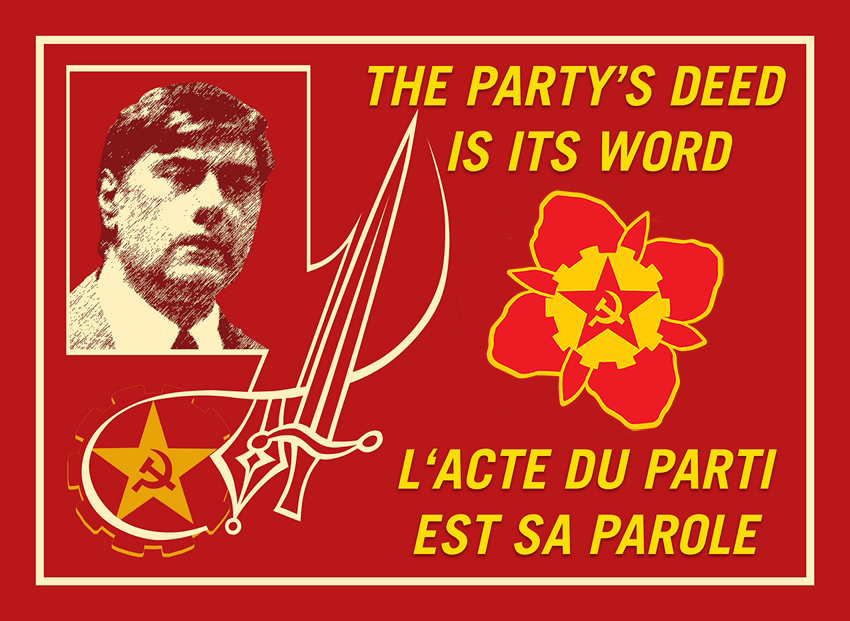|
August 15, 1939, Birth of Hardial Bains Hardial Bains -- A Man of Revolutionary Action
On August 15, we celebrate the birth, life and work of Hardial Bains, founder and leader of the Communist Party of Canada (Marxist-Leninist). Hardial Bains was, above all else, a man of revolutionary action. He came to Canada as a youth from India in 1959 and immediately integrated with the life of the working people in British Columbia and took up the struggles of the student youth with whom he shared weal and woe. The late Charles Boylan, who was also a youth at the University of British Columbia at the time Hardial got a science degree, wrote about the conditions in those days. "Imagine
the situation. The world, including the entire range of ideological and
theoretical schools of thought, was frozen in Cold War dogma.
Disinformation and misinformation were the norm, whether it came from
the schools of Euro-American imperialism or the schools of Euro-Soviet
communism. A condominium of reaction undermining the historic
achievements of communism, revolution and national liberation was in
place. All avenues to independent analysis and thinking were barred in
practice if not in scripture. Yet the feeling 'the world is not going
to remain the same' was pressing on the hearts and minds of the youth.
The necessity for change was impelling. What was missing and most
needed? What key was necessary to unlock that dialectic of change? "In 1963, Hardial Bains was a 23-year old graduate student at UBC, who four years earlier immigrated to Canada from Punjab, India to study microbiology. In Punjab, Hardial had earned a well-respected reputation as a deep-thinking revolutionary communist and scientist whose political activism and scientific investigation were said to have begun the moment he could breathe on his own. But what to make of this world in the imperialist heartland and internationally, in which the conditions were so complicated that even the idea of a proletarian front for revolution had been declared a dead letter even by many communist parties?
"The Cold War was suffocating everyone to the point where the right to conscience was banned. Hardial Bains refused to accept the block on thinking and called on students and faculty to defend themselves and express their right to conscience through actions with analysis. One of his first public acts was to stand up courageously to the 'better dead than red' psychological terrorism of McCarthyite anti-communism. At a mass democracy meeting, standing atop the popular soap box in the public square in front of UBC library, Hardial faced down the hysterical finger-jabbing scream from the fringe, 'That man is a communist!' replying instantly, 'Yes, and proud of it!' "Reflecting upon the incident later, Hardial said this response was a historic turning point in the sense that it publicly 'smashed the cringing cowardice and spinelessness of the communists of the time.' The refusal to defend one's right to conscience became a feature of the past. Communists were called upon to be open and proud of their views and the accomplishments of the workers' and communist movement. This was the 'beginning of the New. Nothing can stop this movement now,' he concluded from this experience. But the New was small like a single cell of an organism beginning its journey in life." Hardial had the ability to listen to and heed the call of history to organize to bring about the changes required to open society's path to progress, always keeping in sight how to remove the main obstacle to moving forward. He based his actions on what the situation revealed in the particular conditions and circumstances, ensuring an organization was put in place to gather together all those in whose interest it was to bring about the required changes to the conditions. For this to occur, he always followed the dictum: Unite the Advanced Forces to Mobilize the Middle and Isolate the Backward. He made sure that the clash between Conditions and Authority would be resolved in a manner which favoured the interests of the working peoples at home and abroad and the cause of the peoples and nations everywhere for peace, freedom and democracy. Hardial Bains heeded the call of Engels that Marxism is Not a Dogma but a Guide to Action. He also profoundly followed the maxim No Investigation, No Right to Speak to emphasize the necessity of going into the heart of the matter at any time so as to discern the line of march and devise as its integral part the tactics required to achieve the aim set. In this way, Hardial set an example of what it means to oppose the disinforming role of the state, which seeks to deprive the people of their own ability and outlook to establish their own vantage points and act in a manner which favours their interests.
As he famously wrote in the Necessity for Change pamphlet, which sold thousands of copies amongst the youth and students and revolutionary forces in the 1960s, this call places revolutionary action at the centre of all our endeavours. Only when an individual is in the fray, in the battle, with the aim of humanizing the social and natural environment in the specific circumstances faced, does the line of march emerge from what the situation reveals. Only on this basis of putting revolutionary action at the centre of our concerns, can one be worthy of calling oneself a Marxist-Leninist, Hardial pointed out. By paying attention to what is continuously coming into being and passing away, which we call the ensemble of relations of humans to humans and humans to nature, the necessity for change is revealed as the need for the people to establish their own political power in the course of settling scores with the old conscience of society. Only then will the pre-history of humankind give way to the people themselves becoming the makers of history. From the old way of handing over the use of their voice and name to others, the people will finally speak in their own name, Hardial forcefully pointed out. At each stage of the development, Comrade Bains led members and supporters to achieve numerous significant accomplishments, including: - uniting the Marxist-Leninists in one organization based on Marxism-Leninism and democratic centralism in the late '60s; - founding the Communist Party of Canada (Marxist-Leninist) in 1970, as the necessary instrument to forge the unity of the working class to accomplish its mission of constituting the nation and vesting sovereignty in the people; - taking bold stands in defence of all when the state launched racist attacks against Afro-Canadian students, as well as the Indigenous peoples and peoples of South Asian and West Indian origin in the late sixties and early seventies; - establishing on a profound anti-imperialist basis the solidarity movement in this country to support the struggles of the peoples of Asia, Africa, Latin America and the Caribbean for liberation. Included within all this was the militant support he organized for an independent Cuba against the Bay of Pigs invasion and during the so-called missile crisis, and for the national liberation of Vietnam and other countries of Indo-China fighting against U.S. imperialist aggression. He also led the reorganization of the Hindustani Ghadar Party abroad in 1969, on the basis of democratic centralism to carry forward the traditions of the Ghadri Babas and for the liberation struggles in India. Hardial's important contributions also included the defence of Marxism-Leninism and the elaboration of Contemporary Marxist-Leninist Thought. His work in the field of philosophy and the social sciences included paying first-rate attention to the crucial relationship between form and content, and to the study of Marxism-Leninism amongst the youth, and to push forward the movement for enlightenment. He spearheaded building the Party press and non-Party press and the technical base for the work of the Party on every front. His contribution to the study of the constitution of European nation-states and how sovereignty was established in a fictional person of state to deprive the people of decision-making power led to the powerful program of opposition to euro-centrism, reliance of each people on their own thought material and for democratic renewal and the call to break with the past and move on.
|
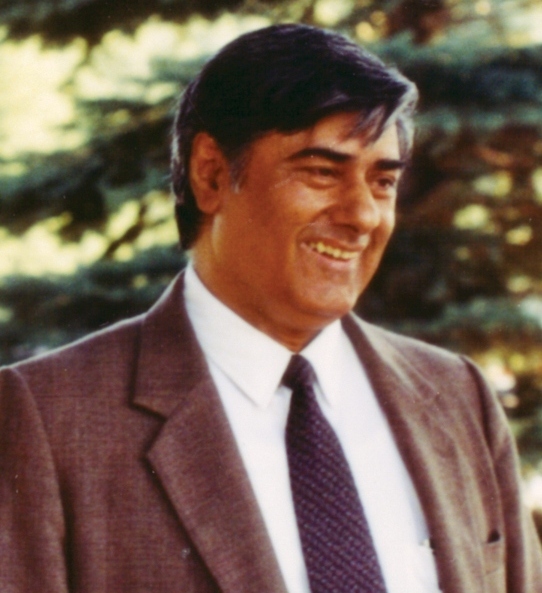 Hardial Bains
Hardial Bains 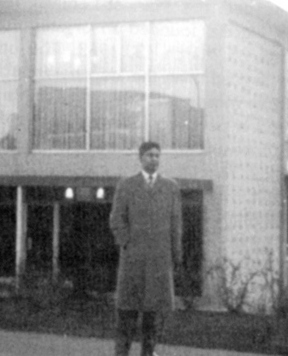
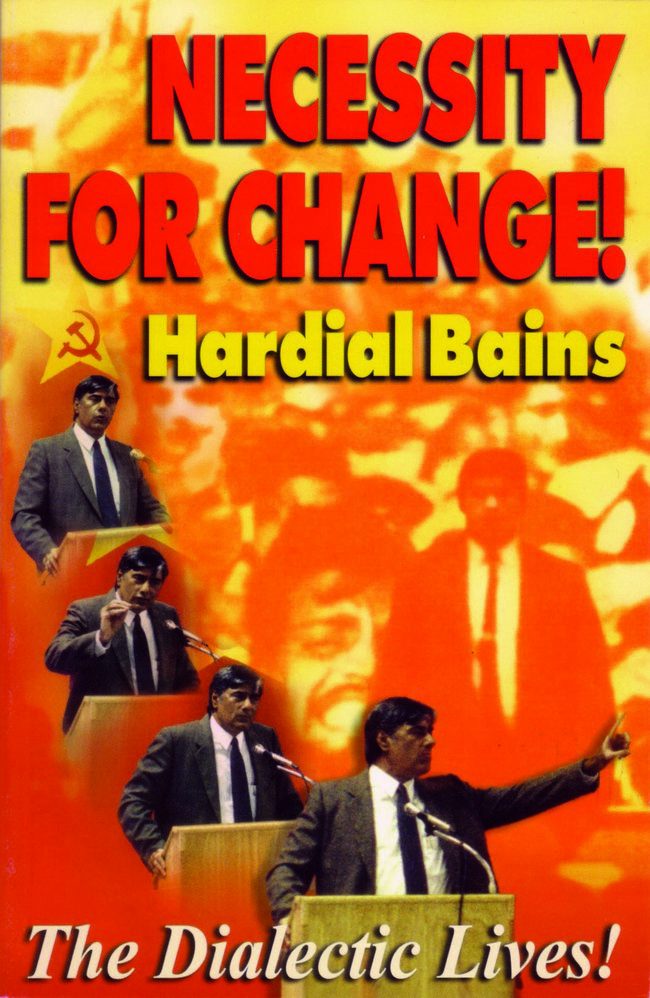 Of all the relevant writings and documents
Hardial Bains produced during his lifetime, the most significant was
the Necessity for Change analysis. It drew warranted conclusions about
the degenerate culture and conditions imposed on the youth as a result
of the Anglo-American imperialist influence during the 1960s and the
anti-communist crusade. Based on the Necessity for Change analysis, he
concluded that
Of all the relevant writings and documents
Hardial Bains produced during his lifetime, the most significant was
the Necessity for Change analysis. It drew warranted conclusions about
the degenerate culture and conditions imposed on the youth as a result
of the Anglo-American imperialist influence during the 1960s and the
anti-communist crusade. Based on the Necessity for Change analysis, he
concluded that 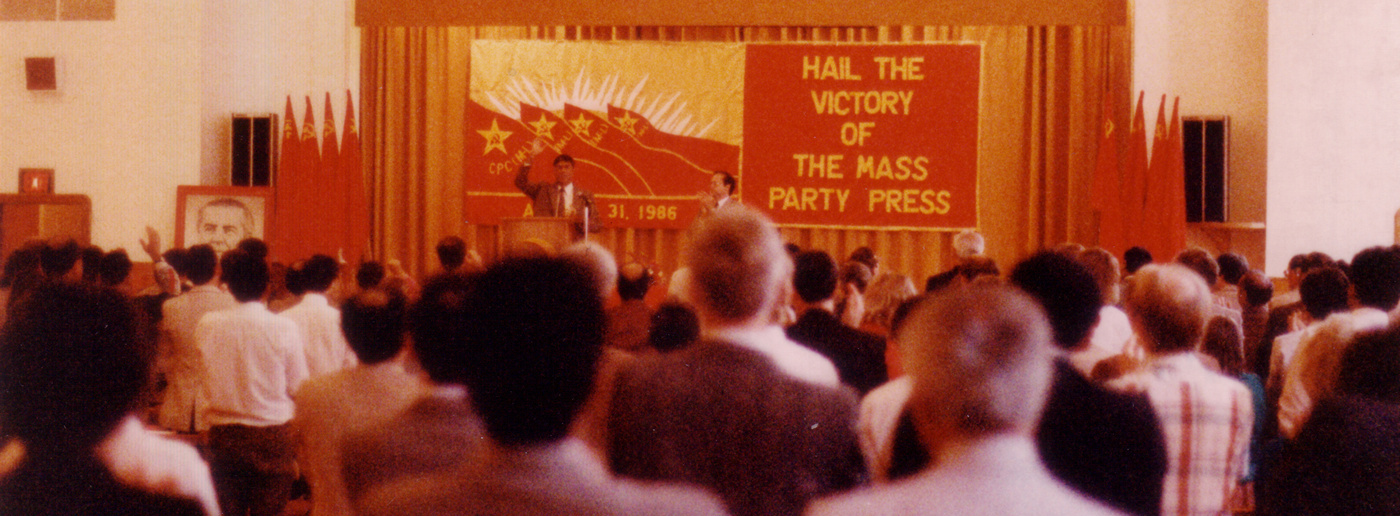 Hardial Bains addresses celebration
of successes in building the Mass Party Press,
Hardial Bains addresses celebration
of successes in building the Mass Party Press, 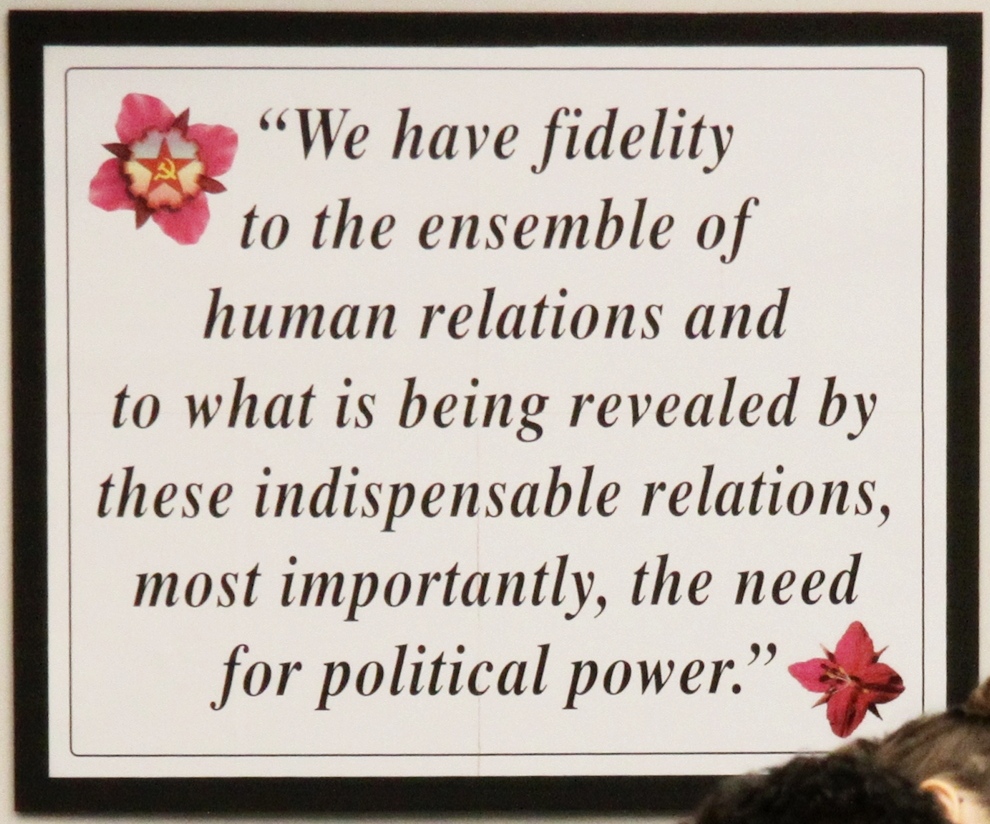 For instance, the
significance of fidelity to the ensemble of human relations is that
modern society has at its heart a power that mediates between the human
productive powers and the existing political association. Using
fidelity to the ensemble of human relations as a guide, we direct
attention to social structure, the order of it and what is its measure,
so that we can make predictions.
For instance, the
significance of fidelity to the ensemble of human relations is that
modern society has at its heart a power that mediates between the human
productive powers and the existing political association. Using
fidelity to the ensemble of human relations as a guide, we direct
attention to social structure, the order of it and what is its measure,
so that we can make predictions.